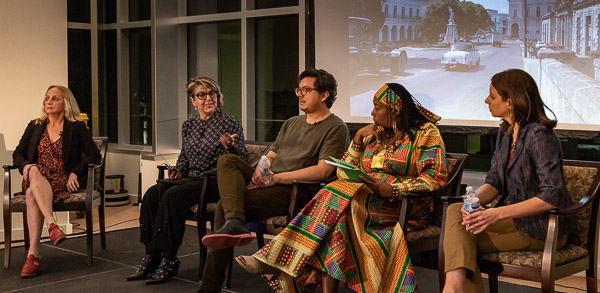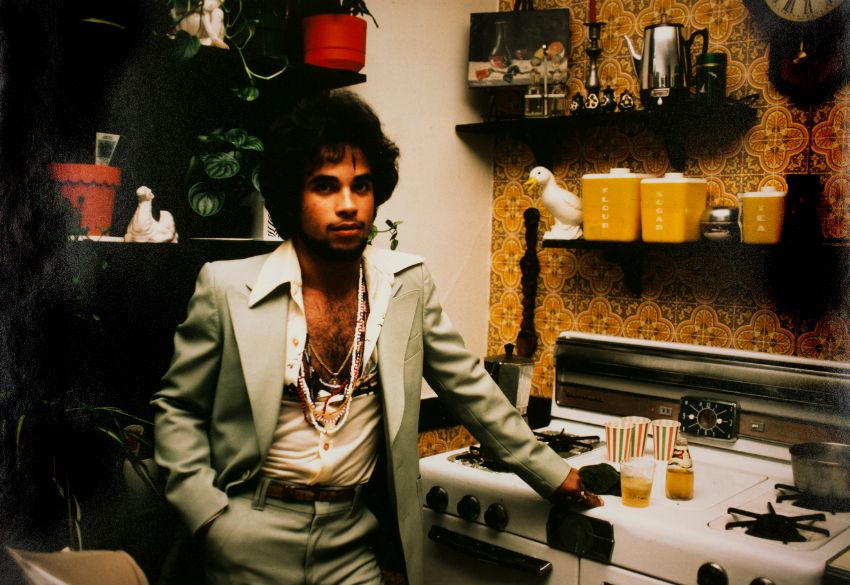|
|
|
|

Director's Statement
Dear Readers:
We kicked off 2019 by honoring the five Cuban women who founded what is
today the largest repository of resources on Cuba and its diaspora, the
Cuban Heritage Collection (CHC) at the University of Miami Libraries. |
|
|
Rosa M. Abella,
Esperanza Bravo de Varona, Gladys Gómez-Rossié, Ana Rosa Núñez, and
Lesbia Orta Varona began their collecting efforts as early as the 1960s
toward building a unique collection that documents Cuban and Cuban
American history from the colonial period to the present. Their vision
to secure a permanent home within the library for the CHC became a
reality in 2003 with the inauguration of the Roberto C. Goizueta
Pavilion, located on the second floor of the Otto G. Richter Library.
This past February, the University of Miami officially recognized the
hard work of these visionaries and celebrated their legacy at a
beautiful reception; Nuestra Herencia: Honoring the Founding Women of the Cuban Heritage Collection was hosted by President Julio Frenk and Dean of Libraries Charles Eckman.
|
|
On the academic
and research side of our operations, the CHC hosted two Goizueta
Fellows in the spring: Laura Almeida, Ph.D. candidate in Art History at
Pennsylvania State University, and Carina Schorske, Ph.D. candidate in
English and Comparative Literature at Columbia University. After a
month-long residency, they both presented on their respective
dissertation topics, which coincidentally found common ground in the
work of renowned Cuban American artist, Ana Mendieta. Almeida's Staging Loss: Reenacting and Forgetting in Tania Bruguera's 'Homenaje a Ana Mendieta'
argued that Bruguera's reenactments of Mendieta's performances, rather
than acts of remembering, perform a type of erasure. While Schorske's Scattered Bodies, Fugitive Forms: American Women Artists in the Caribbean provided
a comparative analysis between Ana Mendieta's rupestrian sculptures and
Lydia Cabrera's painted stones vis-á-vis Caribbean indigenous artistic
practices, specifically Taino.
The doctoral work mentioned above underscores the Goizueta Graduate
Fellowship Program's mission to support research for innovative
scholarship in Cuban and Cuban American Studies. This inter and
cross-disciplinary approach defines new trends in the field; such is the
driving impetus behind our third installment of New Directions in Cuban Studies conference to be held on October 17 and 18, 2019. The Call for Papers
is currently out, and we encourage you to participate in what promises
to be an engaging platform for discussion among emerging and established
scholars.
The summer continues to keep us busy at the CHC as we host a new group
of Fellows for the 2019–2020 cycle of the Goizueta Graduate Fellowship
Program. In addition, we are working arduously on a robust line-up of
exhibitions and public programs for fall 2019 and spring 2020—stay
tuned!
Warm regards,
Elizabeth Cerejido
Esperanza Bravo de Varona Chair
Cuban Heritage Collection
University of Miami Libraries
|
|
Goizueta Foundation Graduate Fellowship Program
2019–2020 Awards Announcement
|
|
|
The Goizueta Foundation Graduate Fellowship Program
provides assistance for supporting doctoral research at the Cuban
Heritage Collection. The goal of the program is to engage emerging
scholars with the materials available in the CHC and thus contribute to
the larger body of scholarship in Cuban and Cuban diaspora studies. As
part of their fellowship residency, they are asked to present on their
research and are streamed via Facebook Live.
|
|
Graduate Research Fellows
Alyson Cluck
University of Maryland (Art History and Archaeology)
Forms of Encounter: Zilia Sánchez's "Topologías Eróticas" in 1960s New York
John Ermer
Florida International University (History)
The Cuban Mahjar: Citizenship, Identity, and Lebanese and Syrian Migration to Cuba, 1880–1970
Juan Esteban Plaza
Stanford University (Iberian and Latin American Cultures)
The Riddles of Perspective: Secrecy Systems and Alternative Communities in Latin American Ethnography, Novel, and Film
Lilianne Lugo Herrera
University of Miami (Modern Languages and Literatures)
Mediated Archipelagoes: Theater, Women, and Media
Yairamaren Román Maldonado
University of California, Berkeley (Spanish and Portuguese/Berkeley Center for New Media)
Caribbean Imaginations in Twenty-First Century Avant-Gardes
|
Graduate Pre-Prospectus Fellows
Miranda García
University of Michigan (Anthropology)
Independent Advertising in Cuba: A Lens on Economic and Social Change
Brandon Mancilla
Harvard University (History)
The Construction of the "Afro-Cuban"
Revolutionary Subject: The Intertwined Histories of Afro-Cuban Politics
and Anthropology, 1940–1970
Fernando Norat
Brown University (History)
Cuban-Soviet Relations
David Roldán Eugenio
Rutgers University (Spanish and Portuguese)
New Rhythms in the Streets of Havana: Spanish Gypsy Immigrants, between Minority and Elite Cubans
Carmen Torre Pérez
University of Pennsylvania (Hispanic and Portuguese Studies/Romance Languages)
Counterhegemonic Mestizaje on a Changing Island: Punk Culture in Cuba
|
|
CHC kicks off 2019 film series with two screenings
The Cuban Heritage Collection continued to
celebrate the pioneering spirit of Cuban women throughout history with
the screening of Emilia: An Untold Cuban American Story,
which inaugurated the CHC's first film series. Directed by Luis
Pérez-Tolón, the film narrates the story of Emilia Teurbe Tolón, who
sewed Cuba's national flag while living in exile in New York in 1850.
Emilia's story is told through the director's personal lens, who as a
distant relative of Emilia, weaves historical documentation with current
footage in search of her story and his roots; a journey that led him to
Spain, Cuba, and Miami.
The CHC also hosted a screening of Cuba's Forgotten Jewels: A Haven in Havana.
Co-directed by Judy Kreith and Robin Truesdale, the film documents the
story of Marion Kreith, who was 14 when she and her family fled
Nazi-occupied Europe and sailed across the Atlantic Ocean to safety in
Cuba. Refugees who made it to Havana, including young Marion, found work
to support themselves and their families in a newly transported trade:
diamond polishing. Firsthand survivor accounts take us back to 1940s
Havana—an era at once tumultuous, heartbreaking, and intoxicating—to
reveal an immigration success story. This program was produced in
collaboration with Dr. Haim Shaked, director of the Sue and Leonard
Miller Center for Contemporary Judaic Studies and the George Feldenkreis
Program in Judaic Studies.
|
|

|
PANEL DISCUSSION
Illuminating the Archives: Art and Artists' Books in Context
As part of the public programming related to our current exhibition, Illuminating Women: Representations and Narratives from Ediciones Vigía,
the Cuban Heritage Collection invited Dr. Tracy Bonfitto, curator of
art at the Harry Ransom Center, University of Texas at Austin; Dr. Josh
Franco, national collector for the Smithsonian's Archives of American
Art; Dr. Linda Howe, associate professor, Wake Forest University, and
Dr. Donna Aza Weir-Soley, associate professor at Florida International
University to discuss the role of art and of materials that support
artistic practice in a scholarly archive. We invited our colleague,
Cristina Favretto, head of Special Collections at the University of
Miami Libraries, to moderate the discussion. The Vigías currently on
view in the gallery at the Goizueta Pavilion provided a context that
allowed for a multidisciplinary conversation on representation, gender,
curating, and artistic practice.
|
|
|
Illuminating Women is scheduled to close the first week of August 2019. For a tour of the exhibit, please email chc@miami.edu or call 305-284-4900.
|
|
TEACHING
at the Cuban Heritage Collection
The CHC regularly hosts class sessions from
multiple academic departments across the UM campus. Both undergraduate
and graduate students engage in hands-on investigation, learning, and
research with historical documents, books, and objects that include
handmade artists' books, maps, photographs, posters, and letters drawn
from the CHC's expansive holdings. These classes, led by CHC
faculty Amanda Moreno and Martin Tsang, offer
a tailored and engaging experiential environment creating opportunities
for students to explore and connect materials in relation to their
learning experiences.
Recently, the CHC has hosted Africa in Cuba/Cuba in Africa; Caribbean History; The Caribbean through Literary and Cultural Studies; and Cuban Art, Art History and the Creation of the Modern Cuban Subject.
Many professors bring their classes at least once per semester to the
CHC to discover materials, and many students return to conduct
independent research for assignments and capstone projects. Students are
often amazed and delighted to be handling objects that can be more than
400 years old, as well as to encounter contemporary and
thought-provoking materials, and each contribute with thoughtful
reflection, a question, or novel finding.
|
|
|
COMMUNITY ENGAGEMENT
at the Cuban Heritage Collection
This year the CHC hosted two visits from the CubaOne Foundation,
a Miami-based nonprofit organization that sponsors free weeklong visits
to Cuba for young Cuban Americans. Before traveling to Cuba, each group
gathers in Miami, and for the evening before their departure they meet
at the CHC, where they learn about our mission and view selected
materials from our collections with the aim of helping to build
historical context and insight into Cuban and Cuban American history.
Each CubaOne trip is themed, and the first visit the group paid to the
CHC in January 2019 was focused on women, which aligned with both the
CHC exhibition opening of Illuminating Women and our film screening and discussion of Emilia.
In May the CHC hosted its second CubaOne pre-trip evening focused on
LGBTQ+ Cuba. UM's Modern Languages and Literatures faculty member, Dr.
Ernesto Fundora, who has published on the subject, was on hand to
discuss Cuba's history of LGBTQ+ and the performing arts.
|
|
|

|
COLLECTION SPOTLIGHT
Luis Medina Photograph Collection
In fall 2018 the Cuban Heritage Collection
received the Luis Medina Photograph Collection as a gift of the Art
Institute of Chicago, through prior restricted gift of Lucia Woods
Lindley. Cuban-born Medina (1942–1985), an architectural and street
photographer, documented the Latinx and LGBTQ communities of Chicago
from the 1960s to the 1980s. He often worked with José López, together
amassing a collection of thousands of images of daily life in one of
America's largest urban centers. Medina left Cuba for Spain in 1958,
studying art before eventually immigrating to Miami to rejoin his family
in 1961. He and López both moved to Chicago in 1967 to study sculpture
at the School of the Art Institute, eventually focusing their artistic
work in photography.
A catalog of his work, Facts and Fables by Luis Medina, Photographer,
was published posthumously by the Art Institute to accompany a solo
exhibition of his work in 1993/1994; this book, in addition to his
archive of over 8,000 slides, 7,000 silver gelatin prints, 4,000
negatives, notebooks, and correspondence, is now available for research
in the CHC Reading Room. This donation represents an important addition
to our collection of contemporary Cuban American photography, an area we
are actively seeking to grow and strengthen as a collection development
priority.
Medina's work is held at the Art Institute of Chicago, the Museum of
Contemporary Photography at Columbia College Chicago, and the Center for
Creative Photography at the Phoenix Art Museum.
Photo: Santero, ca. 1980, Luis Medina Photograph Collection
|
|
|
|
|
|
|